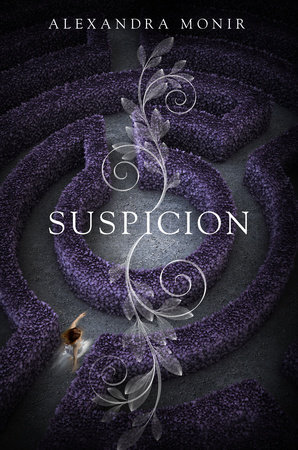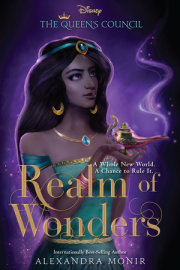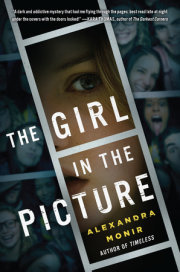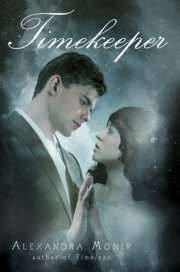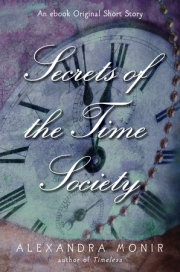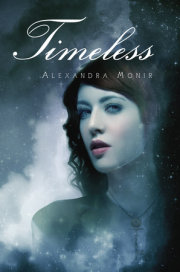I
July 2007
I sit up straighter in the backseat, gripping Mum’s hand with excitement as the car winds its way through the roads of Wickersham Village. When we reach the pair of black iron gates, gilded with the Rockford family crest, I know the moment I’ve been looking forward to has finally arrived: the first glimpse of my favorite view in England.
The gates part, and our car sweeps through the entrance. I lean out the window, gazing in awe at the rippling blue lake, the vast parkland stretching ahead for miles, and the curling tree branches pointing us toward a palace in the distance. Rockford Manor, the country house that’s belonged to Dad’s family since the eighteenth century, is more like a fairy-tale castle than a house, with its grand columns, domed towers, acres of gardens, and nearly two hundred rooms--most of which I still have yet to explore.
“We’re home!” Dad says cheerfully, turning around in the passenger seat to smile at Mum and me.
“I wish it was home,” I reply, bouncing in my seat as we draw closer to the house. “Lucia is so lucky she actually gets to live here.”
“And you’re lucky that you have such a nice home in New York to return to,” Mum says pointedly, always on the lookout for any sign that our annual summer trips to Rockford are spoiling me.
“I know, I know.”
And it’s true. I love our Tribeca apartment, even more so since my friend Zoey Marino moved into the building. But each summer I find myself increasingly enchanted with Rockford Manor and the scenes of English country life: horseback riding through the park every morning with my cousin, playing cricket on the lawn, afternoon tea with buttery scones served in the Rose Garden, rainy days curled up in the vast library, wandering through long corridors filled with a museum’s haul of artwork, and most of all . . . visits from the only boy I have ever cared to be friends with: Sebastian Stanhope.
I don’t think I’ll ever understand why Mum and Dad chose to move away when I was born, instead of staying in paradise at Rockford Manor. I’ve asked them about it dozens of times, but their answer is always that we moved to New York for Dad’s job--which seems a bit strange, since England has lawyers too.
My thoughts slip away as we reach another gate beneath a towering stone arch, an indication that we’re nearly there. The car’s tires crunch against the gravel as we pull into the curving driveway, the perfectly mown lawns on either side of the road curving along with us. And suddenly we’re in the Great Courtyard, bordered by the manor’s stone-carved walls, columns, and towers. Yards away, on the steps leading into the mansion, I can see them forming two lines to greet us--the family in front, the staff in back.
“Mind your manners, Imogen,” Mum says gently as the car slows to a stop in front of the house. I nod impatiently. The driver hurries to open the doors for us, and Mum and I follow Dad into the Great Courtyard. I draw in my breath as I take my first steps on Rockford soil, my heartbeat quickening at the sensations I only ever feel when I’m here. The wind whispers in my hair, the flowers brighten as I pass them, and my body feels different, awakened by adrenaline that I seem to be missing back home. It is stronger today than in past years, and I wonder if anyone will notice--or if my connection to the land is safely hidden in my imagination.
The leaves on the trees sway in a new direction, toward me, and I feel my palms nearly vibrating as I reach for them. But before I can greet the trees, Dad takes one of my hands and Mum clasps my other. I skip between them as we make our way toward the sea of people on the front steps.
My eyes meet Cousin Lucia’s right away, but I know better than to greet her first. Instread, Mum, Dad, and I approach the gray-haired gentleman sitting in a wheelchair at the center of the group: my grandfather, the Duke of Wickersham. Dad bows solemnly and leans forward to kiss his father’s cheek. Mum curtsies and I do the same, my face flushing as it always does whenever I have to curtsy in front of an audience.
I didn’t know my family was different until the day I started elementary school. The other kids treated me normally enough, but everything changed when the final bell rang and the parents and nannies arrived to pick up their charges. For some reason, these unfamiliar grown-ups were eager to meet me, their eyes full of admiration as they spoke my name in hushed tones. And when Mum made her way into the classroom, the attention swiftly turned to her, with excited echoes of “Lady Rockford!” and clumsy curtsies. The whole scene was incredibly confusing, and Mum was forced to explain, as she led me away from the crowd, that my grandfather was the Duke of Wickersham--a title just below royalty. Anyone who watched coronations and royal weddings on TV, who followed the workings of the English aristocracy and read society magazines, knew just who we were.
As important as we might have seemed in America, I soon learned that there was another, superior branch of the family tree: Dad’s older brother, Charles, the Marquess of Wickersham, who will inherit Rockford when Grandfather dies. So just as my uncle Charles and aunt Philippa take precedence over Mum and Dad, my cousin Lucia takes precedence over me. She’s called Lady Lucia even though she’s only twelve, while I’m just Imogen. But I don’t mind. After all, they live at Rockford year-round, and we’re only summertime visitors. It seems natural to me that they’re more important.
I turn to them now, bowing my head to my aunt and uncle as I greet them, and after a giggly “Good afternoon, my lady!” to Cousin Lucia, I’m at last able to drop the formality. I throw my arms around her and she hugs me tightly, her smile letting me know how happy she is that I’ve arrived.
Lucia likes to say that I’m the little sister she’s never had, and it’s a role I’m glad to play. I’ve always been fascinated with my cousin, whose two-year age advantage over me makes her utterly glamorous and sophisticated in comparison. She has a look behind her brown eyes that hints at things she knows, things I haven’t even begun to imagine--and every summer, I hold out hope that she might decide I’m old enough for her to confide her secrets in. Maybe this will be that summer.
Mum gives me a soft nudge, and the three of us move up a few steps to greet the household staff. I can’t help but squeal in delight when I see Oscar the butler, my favorite person of them all.
“Oscar!”
“Miss Imogen.” He smiles broadly and pulls me in for a bear hug. “You’re getting so tall, I might not have recognized you.”
“You always know just what to say, don’t you, Oscar?” Mum grins, leaning over to kiss his cheek.
“It’s good to see you, old boy.” Dad embraces him warmly.
Oscar has been at Rockford Manor since Dad was a kid, so the two of them are especially close. No one on the staff could ever take Oscar’s place--least of all the woman I see moving toward us now. The housekeeper, Mrs. Mulgrave.
I feel myself shrink under the shadow of her statuesque frame. Her eyes, the color of black coffee, stare down at me, and I have the uncomfortable feeling that she’s sizing me up, judging and finding me wanting. Her thin black eyebrows arch as she looks the three of us over, and when she speaks, I don’t meet her eyes--I focus instead on the little black mole on her chin.
“Welcome back, Lord and Lady Rockford,” she says in her smooth voice. “Imogen.”
“Thank you, Mrs. Mulgrave.” Dad shakes her hand, and then exchanges a quick glance with Mum that only I seem to catch.
“You remember my daughter, Maisie.”
Mrs. Mulgrave gestures to the girl farther down the row of staff. She is a few inches taller than me, dressed in a black knee-length skirt and matching blouse, her hair pulled up into a bun.
“Of course.” Mum moves down the line to greet her. “It’s lovely to see you, Maisie.”
I hang back awkwardly, unsettled as always by Maisie’s presence. She stands in marked contrast to Lucia and me, despite the fact that she’s around our age and resembles us enough to be mistaken for a third cousin. But her appearance and age are where the similarities end. While Lucia and I are Rockford heiresses, Maisie works at the manor as a junior maid. In my mind, this is the great flaw of my family’s way of life. Someone like me can be born with so much, while another is forced to make do with so little. There is no rhyme or reason behind it . . . just luck.
As I glance at Maisie now, I find myself siding with her in an imaginary argument, thinking how unfair it is that she should have to live in the servants’ quarters instead of enjoying a childhood like mine. But Dad says this is the norm for children of the staff in English homes--especially children like Maisie, with only one living parent--and he’s promised me that she goes to school in Wickersham Village and is treated well at Rockford. Still . . . it doesn’t seem right.
The cook, Mrs. Findlay, steps forward to greet us next, followed by her kitchen assistant, two footmen, two housemaids, and lastly, Max the gardener. After the long round of hellos, the footmen carry our luggage inside while the rest of the staff disperses. Lucia grabs my hand.
“Let’s go to our boathouse.”
I smile, thrilled that she considers the little haven next to the lake ours. As we turn to go, I sense a pair of eyes watching us. I look up and meet Maisie’s gaze.
“Should we . . . invite her?” I nod toward Maisie.
Lucia gives me an incredulous look.
“Have you gone barmy? Of course not.”
“You’re right,” I say quickly. “I don’t know why I asked.”
But as we run across the South Lawn toward the lake, despite my joy at being back at Rockford with Lucia, I feel a persistent sense of unease.
The next afternoon finds us picnicking in the Shadow Garden, one of a dozen gardens nestled within the acres behind the main house. My favorite of them all, the Shadow Garden is the only patch of Rockford land that is closed to locals and tourists. A wrought-iron gate surrounds it, barring anyone without a key from entering.
I once asked Mum why the Shadow Garden wasn’t open to the public, and she explained that it’s so the family can have an outdoor retreat in the summer months, when Rockford Manor is crowded with day visitors. As much as I relish having the garden all to ourselves, I feel a pang of sadness at the thought of so few people getting to experience its beauty.
A petal-strewn gravel path divides the garden into two symmetrical sections, with lush meadows on either side, flanked by cherry blossom trees. The tree branches stretch out to meet each other, forming a canopy of evergreen leaves and pink blossoms overhead and creating the dancing shadows on the grass that give the garden its name. It’s in this enchanting setting that the family gathers for afternoon tea, with a monogrammed blanket carpeting the grass and Mrs. Mulgrave and Maisie setting up a towering tea table laden with scones, finger sandwiches, and pastries.
As Dad chats animatedly with Grandfather, Uncle Charles, and Aunt Philippa, Mum pulls me onto her lap and begins rebraiding my unruly blond hair. I’m looking around for Lucia, wondering where she disappeared to, when I notice the twinkle in Mum’s eyes and the knowing smile on her lips.
“The Stanhopes are here,” she says in my ear.
I draw in a sharp breath, quickly hopping off Mum’s lap before Sebastian can find me in such a babyish position. It’s bad enough that I’m a mere ten years old when he’s almost a teenager--I have to at least act grown-up.
The grass clings to my bare feet as I stand smiling, watching Sebastian Stanhope follow his younger brother, Theo, and their parents, the Earl and Countess Stanhope, through the gate and into the garden.
Sebastian’s family lives at Stanhope Abbey in the nearby town of Great Milton, and they’ve been close friends of the Rockfords since before my parents were even born. “It’s an inherited friendship,” Dad once joked. “Two great families drawn together, for better or worse, by nothing more than proximity and influence.” To me, the Stanhopes are far more than that. Especially Sebastian.
While the boys at my school in New York pay zero attention to me, Sebastian has been my friend for as long as I can remember. He held on to me so I wouldn’t fall the first time I rode a bike, and every summer he’s included me in his games and laughs. I feel a thrill whenever he pulls up a seat beside me, full of questions about my life in America and always calling me by the nickname he gave me, the name that only he is allowed to use: Ginny. Sebastian is different from any other boy I know; he’s like a splash of color on a dull landscape. Maybe that’s why he’s the only boy I’ve ever wanted to know.
Just as I realize I’m staring a little too openly, Sebastian catches my eye and grins. I’m about to run over to him, when I see a lithe blond figure darting through the trees in his direction. Lucia.
Lucia beams at Sebastian as they greet each other, and she looks prettier than I’ve ever seen her. His smile softens, his expression turning suddenly shy. Their eyes rest on each other a moment too long, neither of them making a move to turn away--and I feel a slightly sickening twinge in my stomach. Has something changed since my last visit?
I can remember perfectly Lucia’s words from last summer: “He’ll be an earl when he grows up, and his parents are good friends with mine--but other than that, he’s just a silly boy like all the rest.”
This summer’s Lucia seems to be singing an entirely different tune. She boldly takes Sebastian’s hand, leading him to sit beside her on the outskirts of our picnic circle. My mouth falls open at the sight of them.
“Jolly good to see you, Imogen!”
Copyright © 2015 by Alexandra Monir. All rights reserved. No part of this excerpt may be reproduced or reprinted without permission in writing from the publisher.

